
A young seven and a half year old started making and selling toffee to support her father’s mission trip. Today Julie and her mother Keely share their family’s story of becoming confectioners to pay it forward to help others.
1. What led you to the mission of being a confectioner?
Julie (daughter): I started the business because my dad was going on a mission trip to Africa and I wanted to raise money for him. 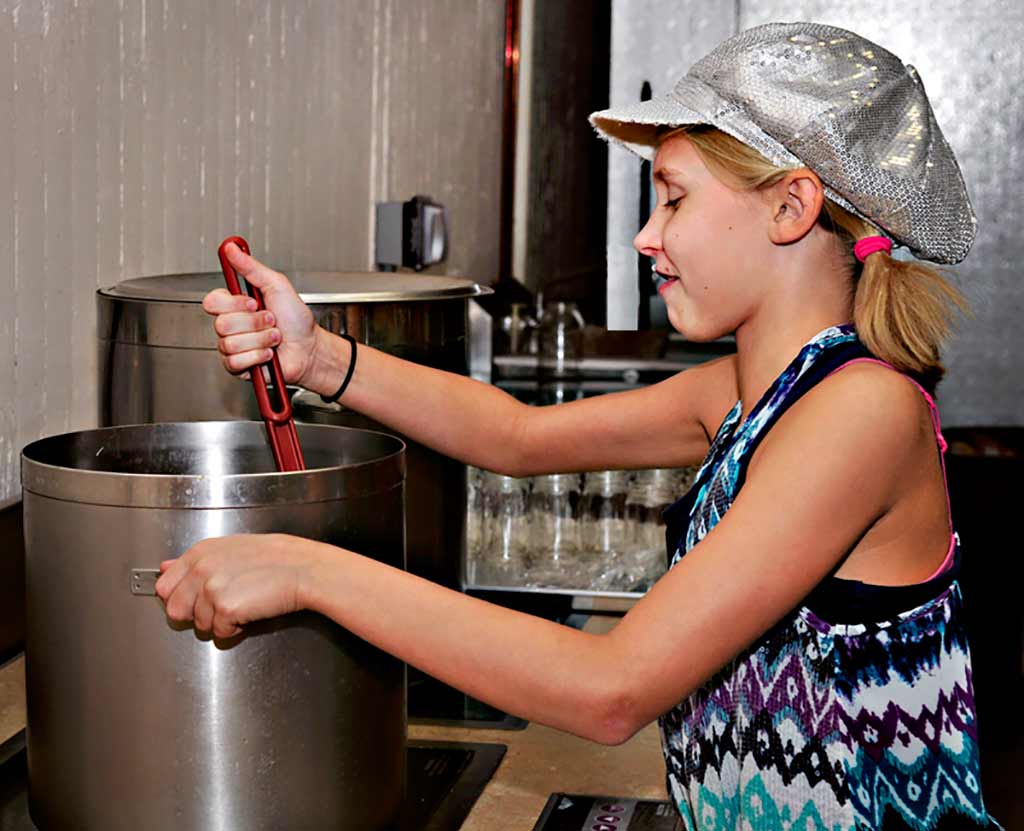 I made toffee and went to market. I’ve been doing it for two and a half years. I’m ten and started when I was seven and a half.
I made toffee and went to market. I’ve been doing it for two and a half years. I’m ten and started when I was seven and a half.
Our friends gave us a recipe, but the toffee was hard and stuck in our teeth. I tried to modify the recipe. I put a little more ingredient of this and a little less of that. That’s how I got the toffee I have now. (Click here to check out Julie’s website, Toffee on the Run. You can also purchase her toffee at her site.)
Our family works together in the business. I mainly package the toffee and go to shows and do interviews and most of the client work. My dad and mom help me make the toffee and to get it marketed. My dad designed and made the website
 Keely (Mom): She wanted to do a fundraiser for her dad and wanted to raise two hundred dollars. She thought, “Well, I’ll sell colored pictures and sell them to the neighbors.” I said, “Why don’t you give people something they really want?” Everyone loves the chocolate toffee we give as presents and at Christmas parties. (They would always lick the plate clean.) I said, “Why don’t you make toffee?”
Keely (Mom): She wanted to do a fundraiser for her dad and wanted to raise two hundred dollars. She thought, “Well, I’ll sell colored pictures and sell them to the neighbors.” I said, “Why don’t you give people something they really want?” Everyone loves the chocolate toffee we give as presents and at Christmas parties. (They would always lick the plate clean.) I said, “Why don’t you make toffee?”
Julie said, “That’s good. That’s great! That’s what I am going to do.” So she had the goal of making two hundred dollars. We made the toffee and she sold it door to door.
She raised her two hundred dollars – literally – the first day. Then she said, “Well, I’ll raise it to five hundred.” So we made more toffee and sold more toffee. We reached the five hundred dollar goal quickly.
Julie said, “I want to make a thousand dollars!” So we kept going and kept going. It took her five weeks to raise the thousand dollars. At times she was tearful. It was freezing cold. It was snowing and we were tromping door to door. We got in the car and I said, “Julie. You just made your thousand.” She shouted, “OOOOOOH!”
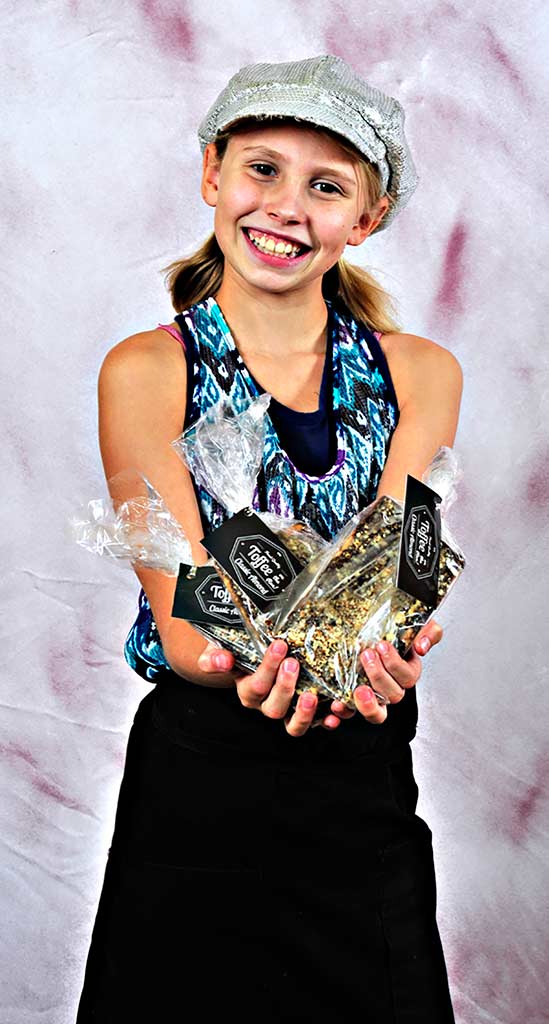 Julie: I started crying I was so happy.
Julie: I started crying I was so happy.
Keely: She cashed in all her one dollar bills.
Julie: But my dad didn’t know any of this.
Keely: He knew nothing. We did it all behind his back.
Julie: He knew we were making and selling toffee but he didn’t know why. He would say, “Now what are you going to do with your money?” I would say, “I’m not really sure Dad.” He kept asking me questions. I told him, “Dad, please stop asking me questions.”
Keely: He said, “You have to have a business plan.” And he had no idea the whole time that it was all for him. She finished, cashed in, and gave him ten one hundred dollar bills and a card. It was the birth of a passion and a business for her. She said, “Is it possible. Could I do this as a business?” I said, “I’m sure there are hoops we’re going to have to jump through and figure this out, but yes, I think you can do it!”
And we have been figuring it out. Word got around and she went to different shows. People who tried the toffee liked it. We have a lot of repeat customers.
2. What does this mission mean to you?
Julie: It’s pretty cool! It is awesome! I love having my own business. It’s awesome! It is a lot of responsibility but in the mean time, I just think of it as what I am doing – paying it forward. I’m glad I can do that today. 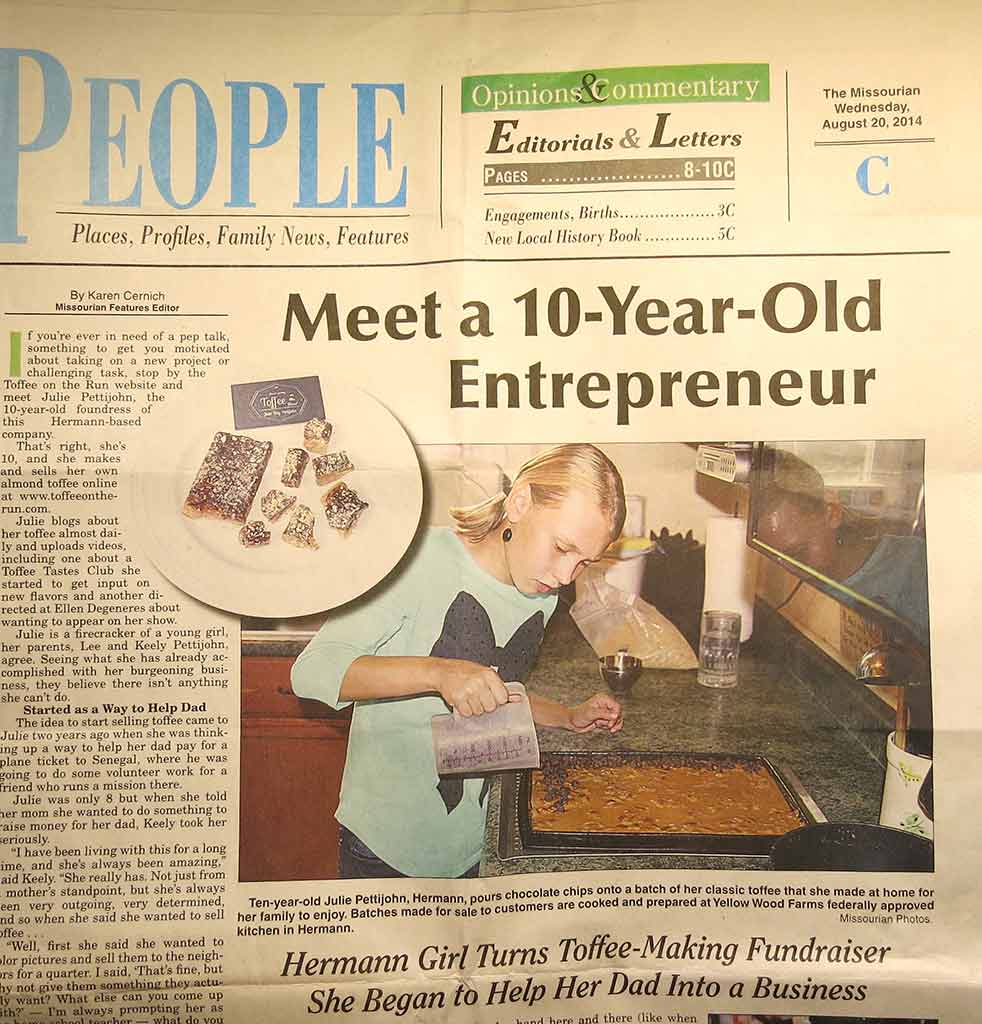 (To the right is a picture of the newspaper article by Karen Cernich featuring Julie Pettijohn in the Missourian, Washington Missouri.)
(To the right is a picture of the newspaper article by Karen Cernich featuring Julie Pettijohn in the Missourian, Washington Missouri.)
Keely: We are called confectioners but we just call ourselves, “Awesome! Julie learned a ton about business through all this. She learned about licensing, the different kinds of approved kitchens, packaging, and food handlers. She learned a very important lesson on how painful it is to go to the store and spend eight hundred dollars on supplies and have to come home and think, “This eight hundred dollars will make me a thousand dollars.” 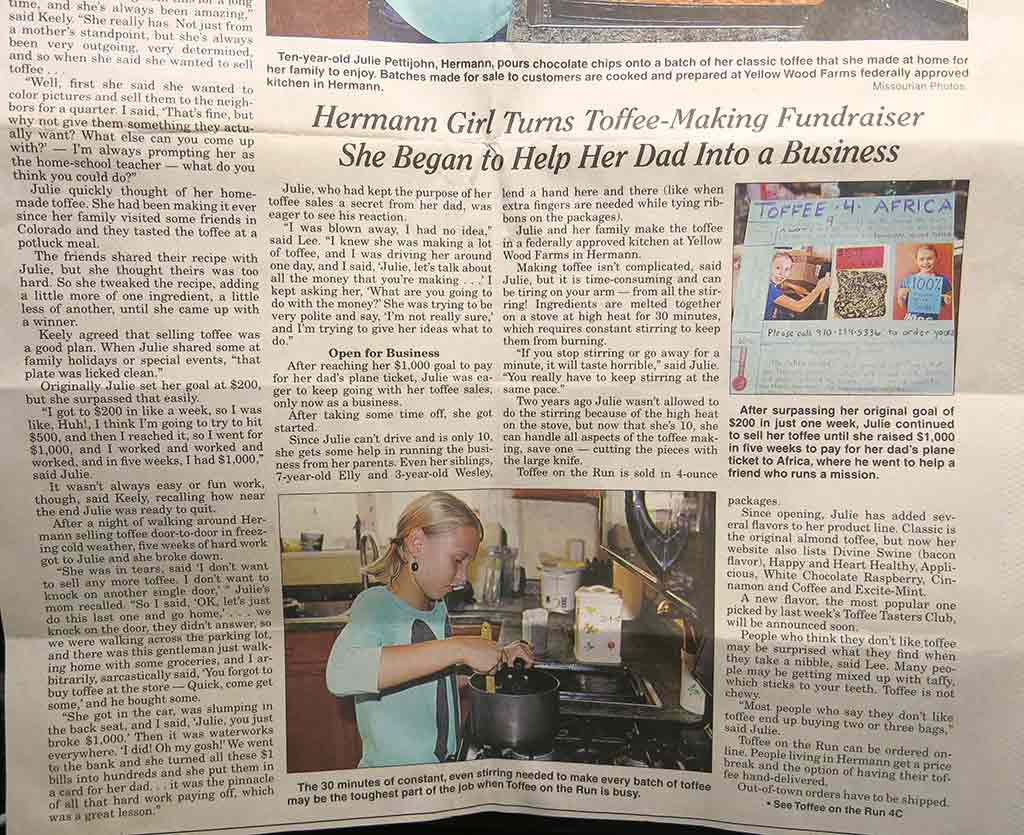 She has had to learn how everything weighs out — such as how we will pay taxes every quarter. There are a lot of different things that are important and as long as she enjoys it, we will continue marketing her business.
She has had to learn how everything weighs out — such as how we will pay taxes every quarter. There are a lot of different things that are important and as long as she enjoys it, we will continue marketing her business.
We home school so in my world everything is a teaching opportunity. The business has really been a great way to watch her struggle, work through things, be successful, and learn about the real world, people, marketing, packaging, presentation, and interaction with other adults. These are wonderful skills that you get with on the job training. And it’s a lot of fun.
We are more involved than we used to be. We used to make her do everything herself. We wouldn’t even stir the toffee for her because we were so adamant that this was her business. Now that the business is getting bigger, dad does the marketing, Julie is the base of the company and she does the interviews and all the trade shows, and I’m stuck at the stove.
3. What was your best day as a confectioner?
Julie: I was going around selling toffee. I only had seven pieces left to sell. I knocked on this lady’s door. I asked, “Hi. Would you like to buy some toffee?” She bought all the seven pieces. That was really nice. That was the most pieces I had ever sold at one time. 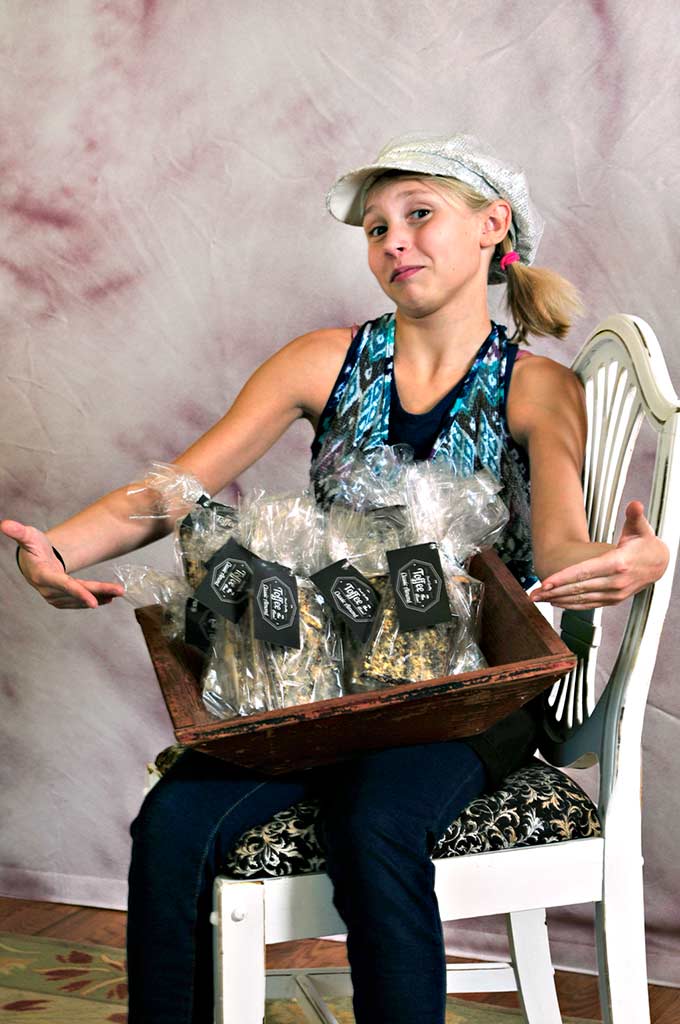 That was pretty big for me.
That was pretty big for me.
Keely: Julie was invited down to Springfield to do the Beer, Wine Cheese, and Chocolate Festival. It was a big deal because she was only person under twenty-one allowed in the building. She had to be guarded and wasn’t allowed to leave our booth because others were showing alcoholic drinks. They really wanted her there with her toffee. Because of that the news station wanted to do a live interview with her. It was their feature story. That interviewed stirred up a lot of emotions in me – that your kid is going to be uncensored on live television – at nine years old. You just never know what someone as precocious as she is will say. She went up there on camera and did a great job and presented well. That was incredible for me. I thought, “Wow. That just sums it all up. That’s what we work for – our children to be mature.”
4. What was your worst day as a confectioner?
Julie: The first time I went to the store I had to buy all the ingredients – all the pans, baking things, and ingredients. It was heartbreaking. I wanted to start a business but had to go and spend a thousand dollars. I thought, “Wow! This is a lot of work.” That was pretty hard. It was hard learning that concept – you have to spend money to make money. I had to buy almonds and butter. These are my two most expensive things. I had to buy Karo, vanilla extract, sugar, and baking mats.
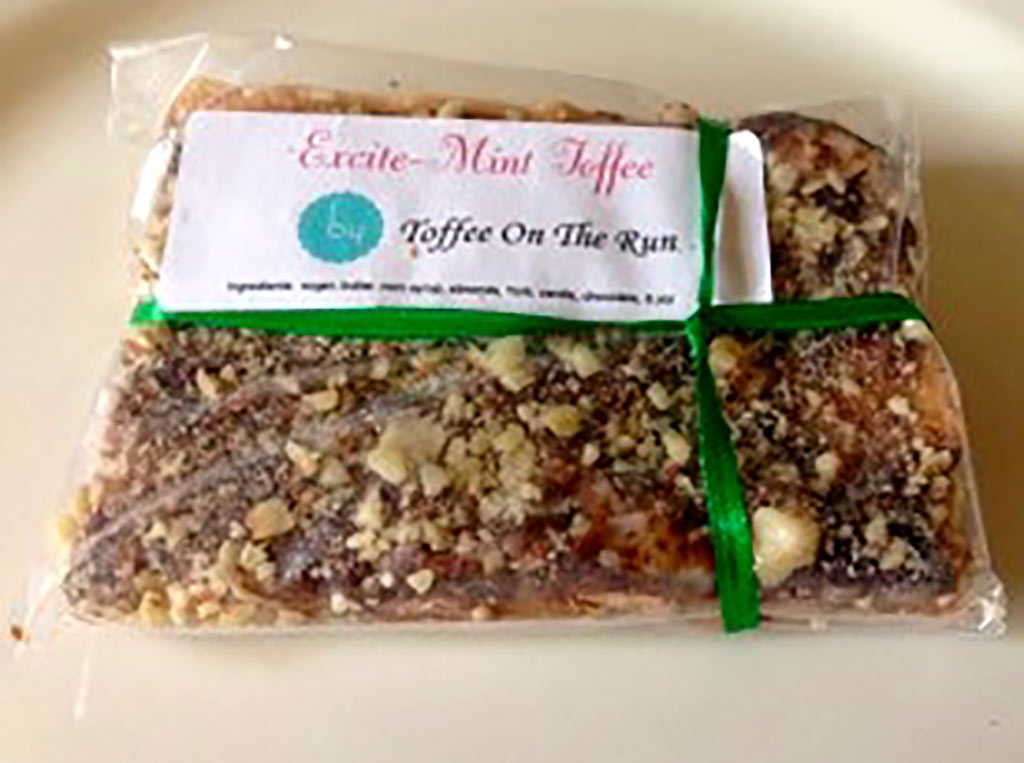 Keely: The mats are sixty dollars each and you have to have a thirty dollar special pan under them.
Keely: The mats are sixty dollars each and you have to have a thirty dollar special pan under them.
Julie: Or it doesn’t work.
Keely: And they don’t last forever.
Julie: One of them started to rip and I said, “Darn it. Another one we will have to buy.”
Keely: We put them to the test. The hardest day for me was when we had gone to a show and we had made a lot of toffee for that show. We were told there would be about fifteen thousand people coming through. They made the comment that vendors tend to sell out. We had big hopes. We thought that even if only every other person bought a piece, we would need a lot. This was very likely because people really like our toffee.
We made a lot, a lot, a lot, and a lot. We made six thousand dollars worth of toffee, brought it down there and sold almost nothing.
Julie: What they didn’t tell us was that vendors “sold out” of samples not product.
Keely: The important lesson was that people had paid a large amount to get into the show. They knew every vendor there was required to give out free samples. So people weren’t coming to buy or spend money. It wasn’t like a craft market where you go in and say, “I’m going to buy all my Christmas presents today.” People came saying, “I’m going to get everything for free today.” So we walked away with almost fifty-five hundred dollars worth of toffee. There were no holidays or occasions coming up.
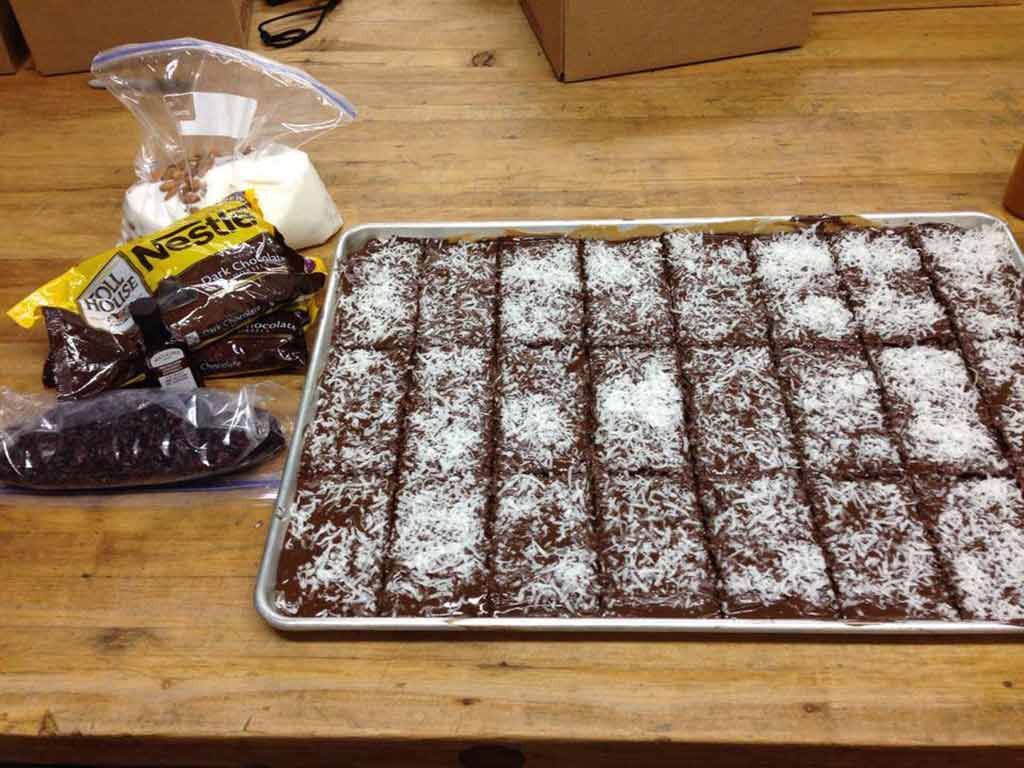 Quite honestly we had to give almost all of it away before the expiration date was up. This made so many of our friends happy. But it was a hard lesson for me to say, “God doesn’t necessarily bless in the way we think He will.” He blessed us abundantly but it wasn’t in toffee sales that day. That was hard for me. Julie was upset and crying. I was upset and frustrated. We had a three hour drive home with the toffee sitting in the car with us.
Quite honestly we had to give almost all of it away before the expiration date was up. This made so many of our friends happy. But it was a hard lesson for me to say, “God doesn’t necessarily bless in the way we think He will.” He blessed us abundantly but it wasn’t in toffee sales that day. That was hard for me. Julie was upset and crying. I was upset and frustrated. We had a three hour drive home with the toffee sitting in the car with us.
Julie: And on the way over to the show, we couldn’t turn on the heater. It was January, cold and we couldn’t run the heater because of the toffee. At every gas station we were buying blankets and heat warmers. It was definitely a memorable time.
5. How did you survive your worst day?
Julie: I survived by knowing and hoping that I have a lot more days ahead of me and that those will be better. I know that you have to have the bad days to appreciate the good days a lot more. I like to be like my mom and dad. They are go-getters and right out there. Hopefully I can learn from their mistakes and try to get better at what I do. That is what keeps me going forward.
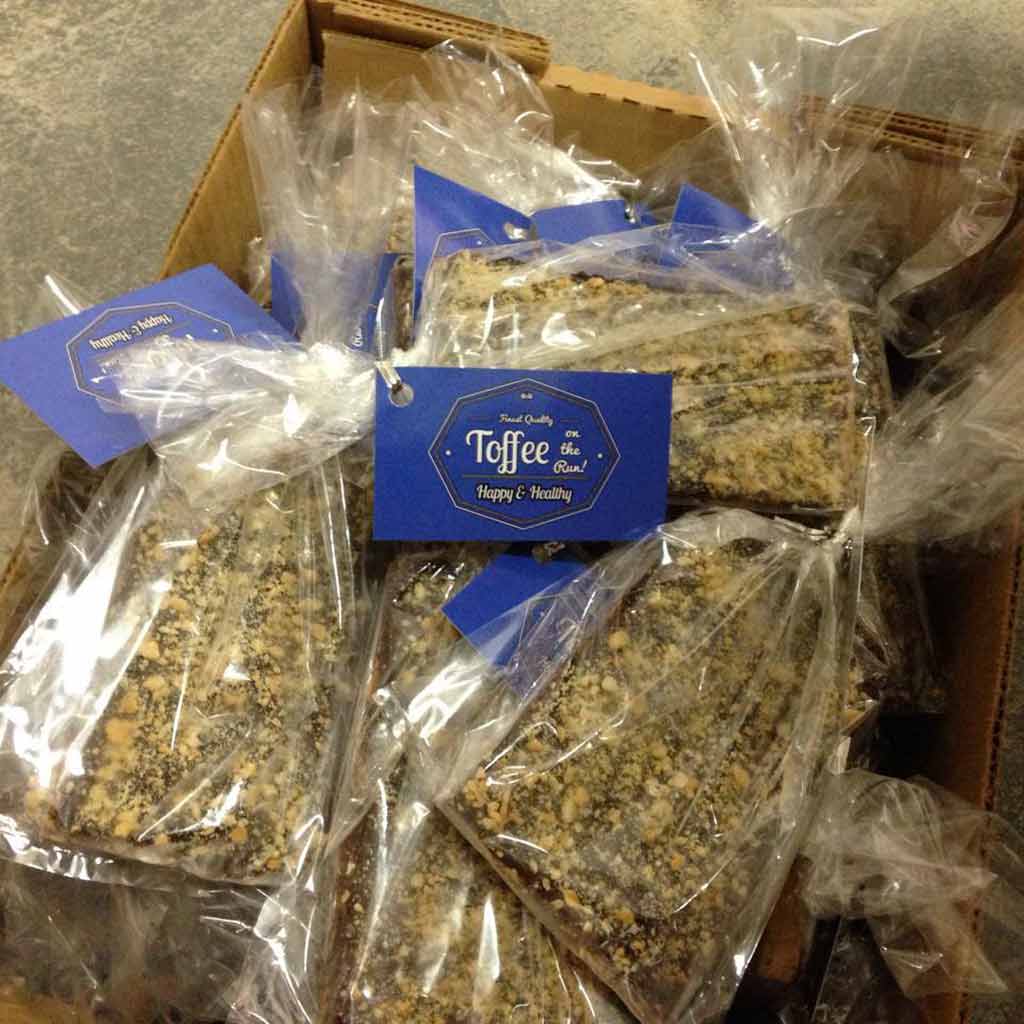 Keely: Our faith is central to everything. Julie nailed it. Sometimes you have to take the bad days to appreciate the good days. Everything is an opportunity to learn. We learned something that day that was valuable. We will never have to learn this again.
Keely: Our faith is central to everything. Julie nailed it. Sometimes you have to take the bad days to appreciate the good days. Everything is an opportunity to learn. We learned something that day that was valuable. We will never have to learn this again.
Hard times are not the end of anything unless you stop trying. We feel like this is what Julie wants to do and we want to do right now. We want to support her. We want to train her. We want to help her grow. As long as we feel like this is what we are supposed to be doing, we are going to give it our all – even when our all doesn’t feel good enough. Then we will just keep going. When we feel like Julie is fighting it or we aren’t enjoying the learning process any more, we will re-evaluate at that point.
6. What advice do you have for someone who would like to become a confectioner?
Julie: If you really want something, you are going to have to work really hard to stay with it and really love what you are doing. 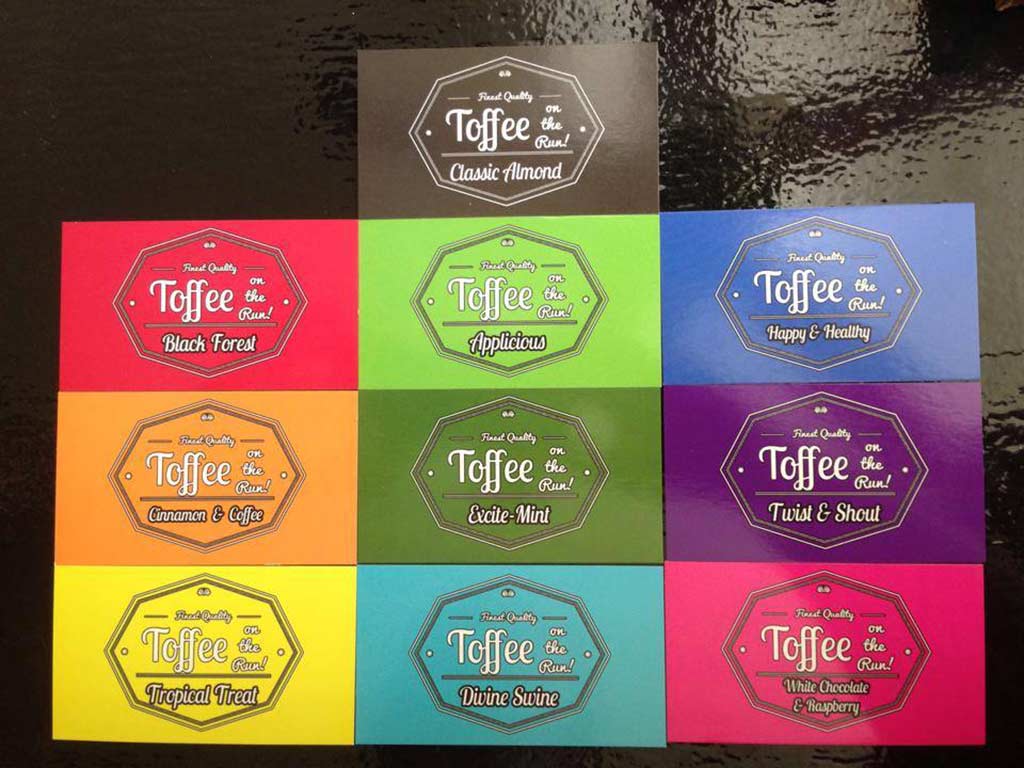 Like my Mom said, if you don’t you won’t really enjoy doing it and you’re not going to have fun doing it. The best is when you really like something, you do it for fun, and it is your business.
Like my Mom said, if you don’t you won’t really enjoy doing it and you’re not going to have fun doing it. The best is when you really like something, you do it for fun, and it is your business.
As long as I can remember and since I was young, I have always wanted to do something to make the world a better place. I’ve wanted to raise money for charities and mission trips. I’ve always had a heart for being an entrepreneur. I want to make goals and when I make those goals I want to have more goals that I can be making.
- « Previous person: Penny Schmidt
- » Next person: Jeff Lipson